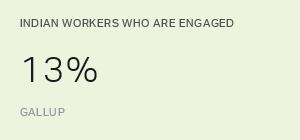WASHINGTON, D.C. -- Although foreign Muslim militants are presumed to be behind the recent terror strike in Mumbai, India, the attack has renewed fears of sectarian violence between India's Hindu majority and Muslim minority. Even before the Mumbai attacks, Gallup Polls had shown Indians increasingly likely to anticipate more conflict between these two groups.

Intercommunal tension between India's Muslims and Hindus is not new to India; friction between the groups predates the country's independence. However, Gallup Polls suggest the rash of terrorist attacks -- with victims and perpetrators on both sides -- since 2006 is placing additional strain on already fragile relations.
As has been the case since Gallup's survey in February 2006, Indians surveyed in July 2008 are still more likely to predict less rather than more conflict between Muslims and Hindus in their country. But the percentage of Indians expecting more conflict has nearly doubled from 12% to 22% in this two-year period, during which there were no fewer than 10 major attacks against Muslim and Hindu civilians.
Gallup's July 2008 survey of India found that, though Muslims and Hindus most often predicted conflict between them will decrease over the next five years, the likelihood among both groups to predict the opposite had risen since 2007. Twenty-five percent of Indian Muslims surveyed this year anticipate more conflict, compared with 15% in 2007. Among Hindus, 22% think there will be more conflict, compared with 18% who thought so last year.

For a majority of Indians surveyed, Muslim and Hindu alike, religious beliefs have not been a source of trouble in their communities. But the drop between 2006 and 2008 in the percentage of Indians who say religion has never been a source of trouble, and the more than one-quarter of Indians (27%) who said this year that religion has been a source of trouble, may signal potential danger for intercommunal relations. Indians who say religion has been a source of trouble in their communities are more likely to predict more conflict between Muslims and Hindus than those who say religion has not been a source of trouble.

The percentages of Indian Muslims and Hindus saying religion has been a source of trouble increased between 2007 and 2008, yet neither group is more likely than the other to say this has been the case. Twenty-six percent of Indian Muslims in 2008 said religion had been a source of trouble and 27% of Hindus said the same.

Indians' estimations of their government's efforts to promote communal harmony remain unchanged since last year. Less than half of Indians surveyed in 2007 and 2008 told Gallup they think their government is doing enough to promote communal harmony, and Indian Muslims and Hindus are united in this regard. However, in 2008 Indian Muslims were slightly less likely to perceive their government's efforts as sufficient.

Bottom Line
Gallup Polls before the Mumbai attacks had already suggested strain on fragile relations between the country's Muslims and Hindus -- and the strain has likely only become greater since. As India's psyche heals after Mumbai, it becomes imperative that its leaders do not allow terrorists and others to further exploit intercommunal tensions. Leaders focusing on the foreign perpetrators of the Mumbai attacks should not lose sight of relations between Hindus and Indian Muslims, specifically, as well as other minority groups, as critical to ensuring Indians' sense of security overall.
Survey Methods
Results are based on face-to-face interviews with approximately 2,000 adults in India, aged 15 and older, in July 2008, 3,186 adults in India in May 2007, and 2,100 adults in Indian in February 2006. For results based on the total samples of adults, one can say with 95% confidence that the maximum margin of sampling error is ±3 percentage points for samples of 2,000 and ±2 for a sample of 3,126. In addition to sampling error, question wording and practical difficulties in conducting surveys can introduce error or bias into the findings of public opinion polls.
